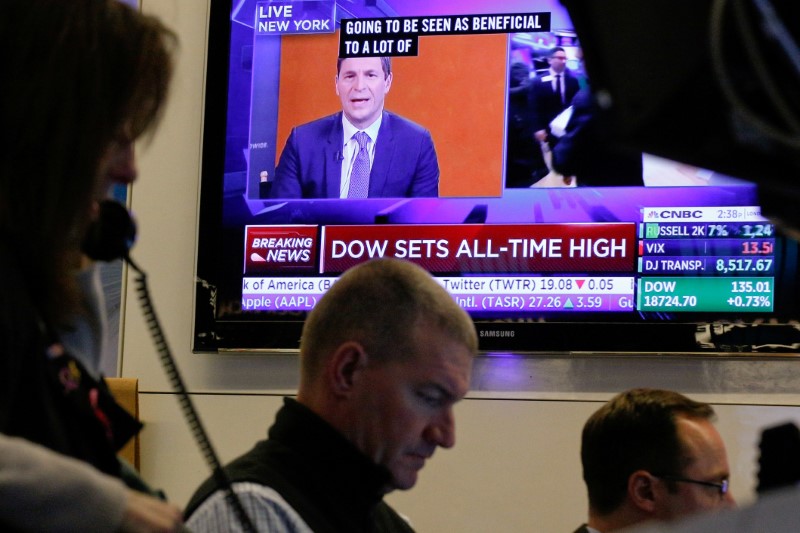By Noel Randewich
(Reuters) - The Dow Jones industrial average ended at a record closing high on Friday, capping off its best week since 2011 after Donald Trump's unexpected victory in the U.S. presidential election.
Since his triumph on Tuesday, investors have been betting on Trump's campaign promises to simplify regulation in the health and financial sectors and boost spending on infrastructure.
"Wall Street is going to be watching a lot of (Trump's) appointments and policy announcements to see whether it validates the more optimistic tone we've seen in the markets in the past few days," said Alan Gayle, senior investment strategist and director of asset allocation at RidgeWorth Investments in Atlanta, Georgia.
The S&P 500 financial index (SPSY) has gained 8 percent in the past three sessions and risen to levels not seen since 2008 during the financial crisis. The financial index has still not recovered to levels seen before the crisis.
Industrials (SPLRCI) have surged 5 percent since the election and healthcare (SPXHC) is up 3 percent.
Tempering sentiment among stock investors, Federal Reserve Vice Chairman Stanley Fischer said on Friday economic growth prospects appear strong enough for a gradual hike in interest rates, but the U.S. central bank is monitoring an increase in long-term government borrowing costs.
The Dow Jones industrial average (DJI) climbed 0.21 percent to end the week at 18,847.66 and the Nasdaq Composite (IXIC) added 0.54 percent to 5,237.11.
The S&P 500 (SPX) declined 0.14 percent to 2,164.45, weighed down by weakness in energy stocks.
For the week, the Dow rose 5.4 percent, its biggest gain since 2011. The S&P 500's 3.8 percent gain for the week was its strongest in two years.
The Nasdaq biotechnology index (NBI) fell 0.64 percent on Friday but ended the week up 10 percent, its best week since 2000.
Nvidia (O:NVDA) jumped 30 percent, helping keep the Nasdaq in positive territory after the graphic chip maker reported its biggest quarterly revenue growth in more than six years.
Walt Disney (N:DIS) rose 2.86 percent after its executives promised earnings growth for the next two years. Barclays (LON:BARC) also upgraded the media company's stock to "equal weight" from "underweight".
Advancing issues outnumbered declining ones on the NYSE by a 1.16-to-1 ratio; on Nasdaq, a 2.36-to-1 ratio favored advancers.
The S&P 500 posted 44 new 52-week highs and six new lows; the Nasdaq Composite recorded 350 new highs and 36 new lows.

About 9.6 billion shares changed hands on U.S. exchanges, far above the 7.5 billion daily average over the last 20 sessions.